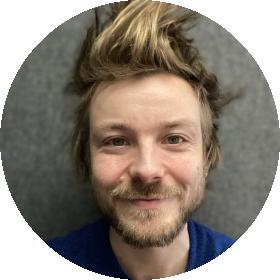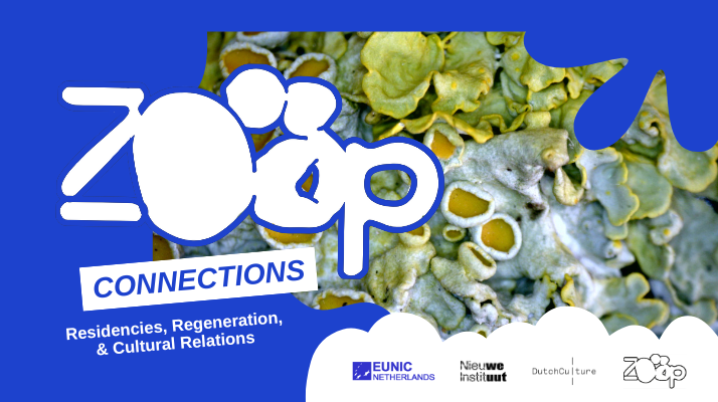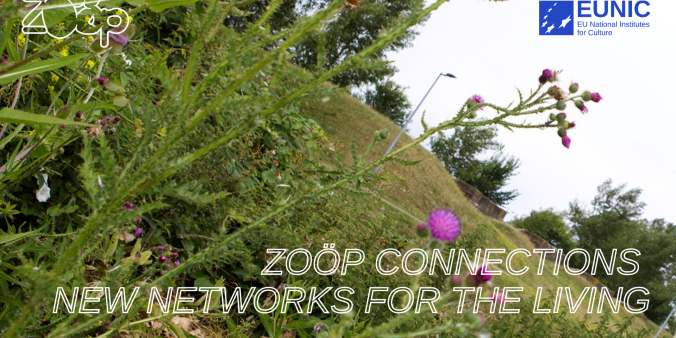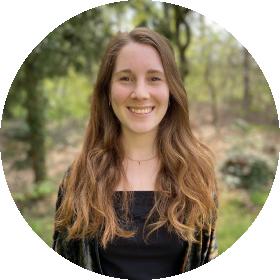
Date: November 12, 2025
Time: 15:30 - 18:30
Venue: Nieuwe Instituut, Auditorium, Museumpark 25, 3015 EK Rotterdam
How can artists and designers help us to redefine our relationship to social and natural ecosystems in a way that supports more life? How do we shape a residency programme with regenerative principles, and why is this important? And what role do cultural relations organisations play in a larger transformation?
This year, five Dutch Zoöps all hosted a resident who offers an alternative way to experience a world that centres around more-than-human life. Estelle Zhong Mengual (France), Fabian Schäfer (Germany), Yolanda Uriz (Spain), Kapinga Muela Kabeya (Flanders), and Ashley Holmes (United Kingdom) were immersed within five Dutch organisations that commit to improving the health of their ecosystems in a time of waning biodiversity and climate catastrophe.
Initiated by EUNIC Netherlands, coordinated by DutchCulture and the Zoönomic Institute, we invite you to our ongoing learning process about regenerative cultural relations surrounding those three questions.
Meet the makers and pick a pod!
During this programme, you will get the opportunity to meet some of the five residents through workshops. We start with these workshops taking place in and around the Nieuwe Instituut to explore the different ways in which we make use of sensing and embodied practice to start noticing all that lives in our direct ecosystem.
15:30 - 16:15 - During these 45-minute slots, you can join any of the following workshop pods:
Pod 1 - "Learning to see" by Estelle Zhong Mengual
Estelle Zhong Mengual - philosopher and art historian, author of Apprendre á voir (Leren Kijken) - followed an exchange programme with Nieuwe Instituut in April and is currently back for her second leg, familiarising herself further with Zoöp-thinking and practice. Throughout her work and during this workshop, she asks: how can our culture deepen our ecological relationships, and how can we find meaning in new ways of seeing?
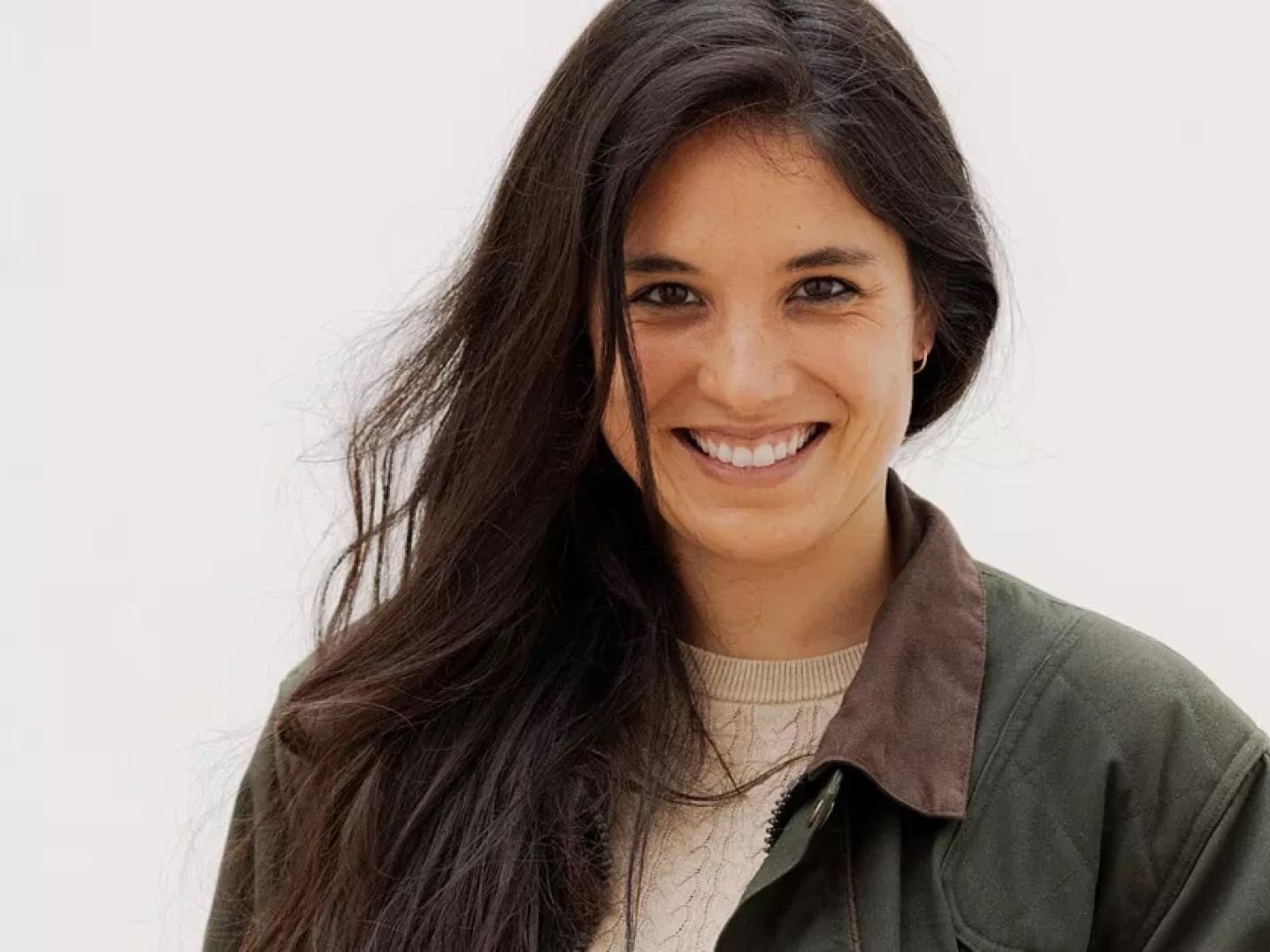
Meet the makers and pick a pod!
Pod 2 - Follow the lichens with Fabian Schäfer
Fabian Schäfer, a visual artist from Frankfurt am Main, spent 10 days this year in a small boat at Zoöp de Ceuvel, studying the life of lichens on post-industrial concrete terrain. In this workshop, he invites participants to explore the hidden ecologies of the urban environment around the institute. Following the traces of lichens, cracks, tree bark, and other city surfaces, we bring their structures to life on paper. Observations, photographs, and collected fragments document the small, often-overlooked ecosystems of the city. The workshop creates a space to attune to the subtle resonances between humans and the more-than-human world — attentively, experimentally, and with a sense of touch.
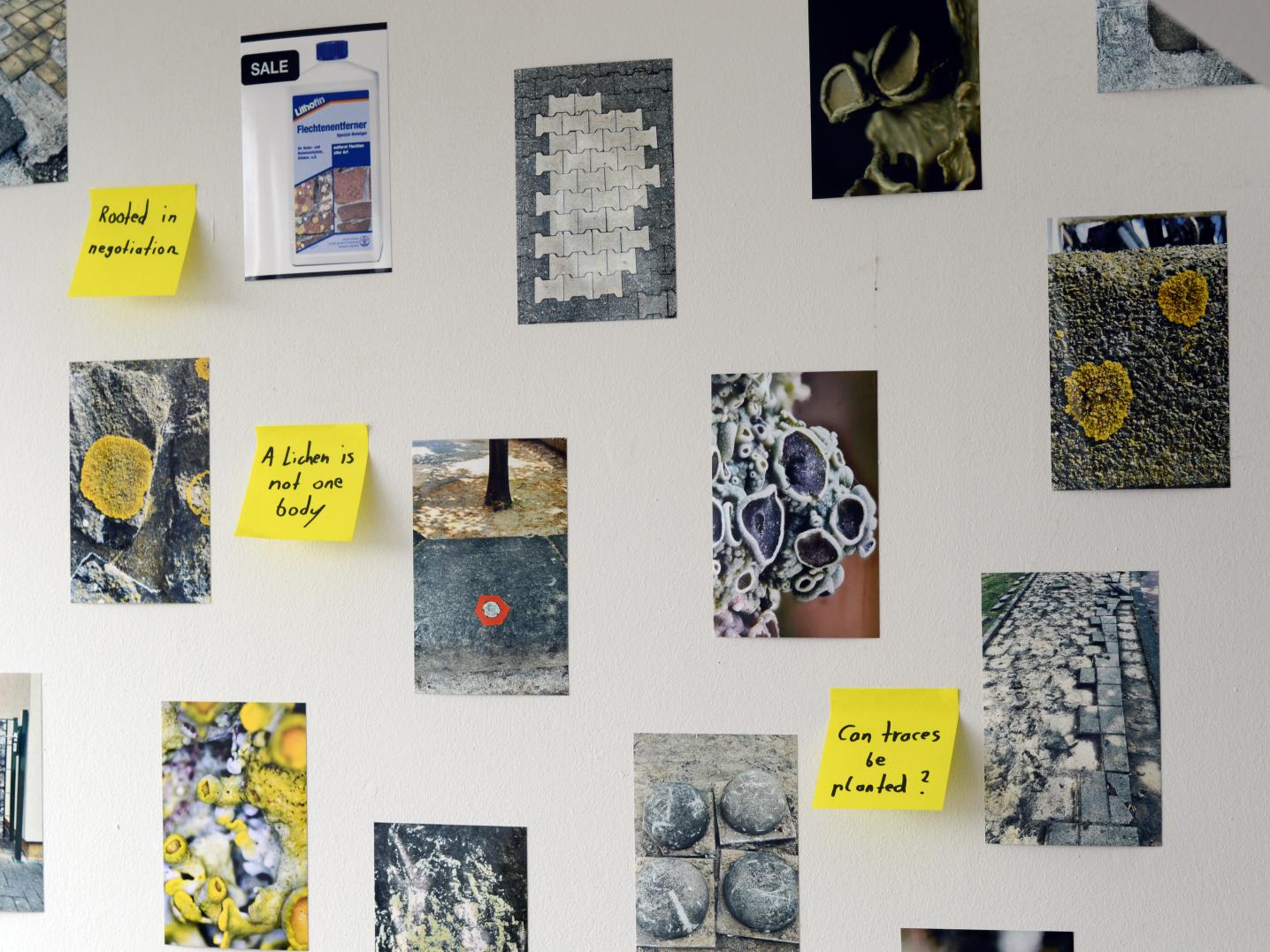
Meet the makers and pick a pod!
Pod 3 - an introduction to the Zoöp Model by Klaas Kuitenbrouwer
For those unfamiliar, you can join this brief presentation to learn about the basic idea of a Zoöp. You will be introduced to all the basic principles and working methods of a Zoöp: What is the role of a Speaker for the Living? How do you work with a Speaker for the Living? How does a Zoöp baseline measurement work, and how does the learning process of the zoönomic annual cycle work? How do you work together with non-human life? You will experience what it is like to look at an organisation as an ecosystem with both human and non-human participants, and you will be given tools to assess the health of this ecosystem. Based on this, you will get new ideas about what needs to change and what decisions you need to make to promote the quality of life of the entire Zoöp.
16:30 - 17:45 - Presentations by the 5 Zoöp Connections
With our senses stimulated and our awareness heightened, join us in the auditorium to join a plenary discussion. First off, moderator Kirsten van den Hul will briefly speak to Klaas Kuitenbrouwer, founder of Zoonomic Foundation, about his view on this project. After that, we learn about all the Zoöps and the residents that visited them this year. What did they actually do from day to day? The Zoops, facilitating institutes and the artists reflect on their role and purpose in this project and share what they have learned, in light of the questions: How do you design a residency in a regenerative way? Was this experience different from other residencies and other ways of organising cultural relations? What implications might this have?
17:45 - 18:15 - Open Q&A
18:15 - 19:15 - Networking Drinks
Keep the conversation going on how to shape regenerative relations with the speakers and the other guests over drinks & bites. And there's more! DutchCulture has the honour to invite five guests representing cultural organisations from across Europe, who, each in their own way, put regeneration into practice. They are pleased to speak to creators and makers with ideas, and are on the lookout for collaborations. Our advisor, Astrid Mörk, will help to connect you to them!
- Isabel Ferreira (ES) – Cultural manager and curator, and co-founder of LABEA – Laboratory of Art, Science, and Nature in Pamplona. She directs ARBOLA, a live arts festival dedicated to plant culture and our eco-social transition, now preparing its fourth edition in June 2025. Through LABEA, she also leads projects such as PLANTADANIA, which develops creative strategies for urban greening, and Materia Bosque (Forest Matter), a video art screening programme exploring the poetic and symbolic power of trees.
- Alexandra McIntosh (FR) – Director of the Centre International d’Art et du Paysage on Vassivière Island. The Centre International d’Art et du Paysage on Vassivière Island supports research, experimentation, production and dissemination of contemporary art. Unique within the French artistic landscape, the CIAPV is celebrated for its remarkable contemporary architecture designed by Aldo Rossi and Xavier Fabre, its open-air permanent collection, and its program of exhibitions, residencies, publications and events exploring art and landscape.
- Evi Swinnen (BE) – Founder and Director of Timelab in Ghent, a laboratory for systemic change and co-creation. Timelab gives time and space to reflect and question the status quo for those who are looking to contribute to a positive and hopeful future for all. Timelab has different laboratories and a tangible gathering space. Timelab is granted by the Flemish Government to carry out research and foster development in the field of architecture and design.
- Janet Vaughan (UK) – Co-Artistic Director of Talking Birds and initiator of The Nest, a creative hub focused on regenerative practice and caring collaboration. The Nest is a Regenerative Creative Practice - exploring ideas, building creative community, cultivating care and reciprocity, and opening space for collectively imagining and nurturing alternative futures. Part of Julie’s Bicycle‘s first cohort of Creative Climate Leaders, she is a keen allotmenteer and wildlife gardener.
- Julia von MuD (DE) – Artist at DoK15518, a collective that works through art and community culture to foster circular and inclusive ways of living together in the rural region of Brandenburg. Julia's collective MuD // logotorium uses care as an artistic method and tool. Their main question is: what does this (space, situation, group) need to fully flourish? We renovate, we build infrastructure, we draw, we write, we sculpt, we make music. We do what the artwork wants us to do because it is the artwork that shapes the artist. This way, we have been created by sound pieces, films, and performances, shaped by manifestations. We were the hosts of a situationist campsite, curated an international music festival, developed immersive happenings and set up a few gardens.
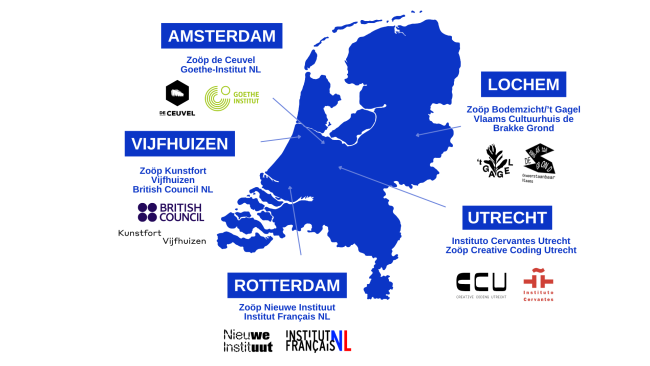
What is a Zoöp?
The word Zoöp is short for Zoöperation. It combines the word 'cooperation' with the Greek word 'zoë' (ζωή) for life.
It is both an organisational form and a learning process that incorporates non-human perspectives into decision-making, advancing regenerative practice.
The Dutch Zoöp-model was developed at Nieuwe Instituut in Rotterdam, the first Zoöp in the world, and set up the Zoönomic Institut to grow the Zoöp network. Any organisation with an intrinsic motivation to contribute to the health of their ecosystems they are part of can become a Zoöp and learn how to contribute to the well-being of their multispecies communities.
Zoöp Connections
Zoöp Connections is an initiative of EUNIC Netherlands and is coordinated by DutchCulture and Nieuwe Instituut in collaboration with Zoönomic Institute.
The residencies were organised by the following duos, each pairing a Zoöp with a Cluster member of EUNIC Netherlands:
- Zoöp Kunstfort bij Vijfhuizen and British Council Netherlands
- Zoöp Stichting Bodemzicht/’t Gagel and Vlaams Cultuurhuis de Brakke Grond
- Zoop De Ceuvel and Goethe-Institut Niederlande
- Zoop Creative Coding Utrecht and Instituto Cervantes Utrecht
- Zoop Nieuwe Instituut and Institut Français NL
This project is supported by the EUNIC Global Cluster Fund.
